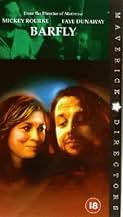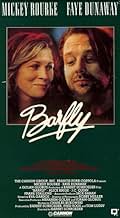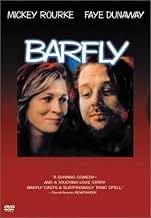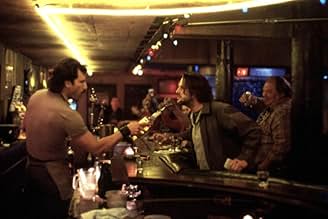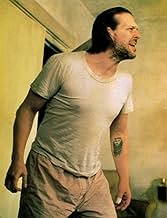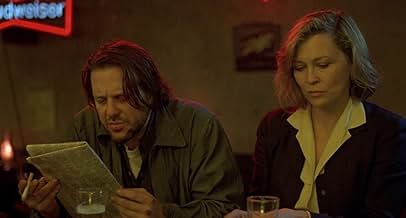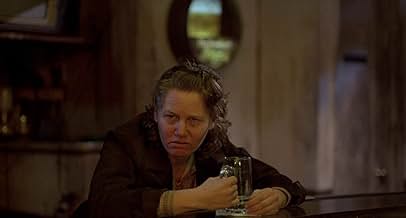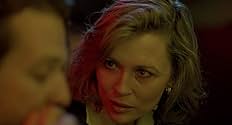AVALIAÇÃO DA IMDb
7,1/10
23 mil
SUA AVALIAÇÃO
Baseado na vida do poeta de sucesso Charles Bukowski e das suas façanhas em Hollywood durante os anos 60, 70 e 80.Baseado na vida do poeta de sucesso Charles Bukowski e das suas façanhas em Hollywood durante os anos 60, 70 e 80.Baseado na vida do poeta de sucesso Charles Bukowski e das suas façanhas em Hollywood durante os anos 60, 70 e 80.
- Prêmios
- 6 indicações no total
Gloria LeRoy
- Grandma Moses
- (as Gloria Leroy)
Zeke Manners
- Roger
- (as Zeek Manners)
Avaliações em destaque
Barfly I think is another great film that is not afraid to tell the truth! a film that does not hold back on things that need to be said in films. The film is based on a true story on an alcoholic and poet Henry Chinaski(Mickey Rourke in an unforgettable role) who does nothing all day and night except cruise bars, drink himself to death and purposely get in to fights with other barmen and customers.He soon meets another alcoholic Wanda Wilcox (Faye Dunaway at a should of been Oscar winning role)when they meet in a bar one night they soon realise how alike they are and how they are the people who the city they live in would rather forget and they soon form a special bond. The films story is totally compelling and unforgettable, the cinematography and realism and forgetting to mention Rourke and Dunaway acting their hearts out. This is a gem of a movie. 10/10.
"Barfly" was a fairly successful film when it was released and garnered generally favorable reviews. Roger Ebert gave it four out of four, and along with "Angel Heart," it helped solidify 1987 as the Year of Mickey Rourke.
However, almost twenty years later it isn't talked so much about anymore, and I feel it deserves to be. Rourke gives one of his finest performances as Henry, a loner who walks hunched over like the Hunchback of Notre Dame. Henry works at a bar as a runner - delivering orders and such. But he's always getting into drunken brawls with the bartender, usually losing.
One day Henry's life takes a turn when he meets a downtrodden woman (Faye Dunaway) and they embark on a relationship.
"Barfly" is a great film. Rourke was vocal later on in his career about his dislike of director Barbet Schroeder, but Schroeder's direction is part of what makes this film so good.
However, the absolute best aspect of the movie is Rourke's performance. Embodying the late writer Charles Bukowski (whose work this was based upon, and who had a brief cameo in the film), Rourke is unrecognizable - like Billy Bob Thornton in "Sling Blade," his entire demeanor and physicality seems to change.
I highly recommend "Barfly" - it's funny, dark, witty, touching and downright enjoyable. One of the best films of the '80s.
However, almost twenty years later it isn't talked so much about anymore, and I feel it deserves to be. Rourke gives one of his finest performances as Henry, a loner who walks hunched over like the Hunchback of Notre Dame. Henry works at a bar as a runner - delivering orders and such. But he's always getting into drunken brawls with the bartender, usually losing.
One day Henry's life takes a turn when he meets a downtrodden woman (Faye Dunaway) and they embark on a relationship.
"Barfly" is a great film. Rourke was vocal later on in his career about his dislike of director Barbet Schroeder, but Schroeder's direction is part of what makes this film so good.
However, the absolute best aspect of the movie is Rourke's performance. Embodying the late writer Charles Bukowski (whose work this was based upon, and who had a brief cameo in the film), Rourke is unrecognizable - like Billy Bob Thornton in "Sling Blade," his entire demeanor and physicality seems to change.
I highly recommend "Barfly" - it's funny, dark, witty, touching and downright enjoyable. One of the best films of the '80s.
I've seen this movie several times... I really enjoy it, even though it centers around the lives of two wretched drunks (played by Rourke and Dunaway) who, if you met them in real life, would probably frighten you to death.
Though both of them are wretched souls indeed, there is nevertheless enough compassion, wisdom, and charm emanating from both of them to make them actually likeable screen characters. And you can't help but do a mental "double take" on many of the lines of dialogue: Rourke's character, with a sort of "beat" hipness, really makes you think about your own life and your own values.
The only flaw I could find was that, considering the incredible amount of drinking that is depicted, I felt it would have been more realistic to show Henry and Wanda having more horrible hangovers, maybe even with frequent vomiting attacks. But then again, maybe these are two people who really know how to hold their liquor. See it, and decide for yourself!
P.S.: NOT recommended that you watch this film if you are on the wagon and trying to stay on it!!
Though both of them are wretched souls indeed, there is nevertheless enough compassion, wisdom, and charm emanating from both of them to make them actually likeable screen characters. And you can't help but do a mental "double take" on many of the lines of dialogue: Rourke's character, with a sort of "beat" hipness, really makes you think about your own life and your own values.
The only flaw I could find was that, considering the incredible amount of drinking that is depicted, I felt it would have been more realistic to show Henry and Wanda having more horrible hangovers, maybe even with frequent vomiting attacks. But then again, maybe these are two people who really know how to hold their liquor. See it, and decide for yourself!
P.S.: NOT recommended that you watch this film if you are on the wagon and trying to stay on it!!
Despite Bukowski's condemnation of Mickey Rourke's portrayal of him/Chinaski in the film (claiming Rourke was too cocky with the role, and didn't stick to the character of Chinaski as Bukowski intended) states Bukowski in the documentary "Bukowski: Born Into This", I still view it as one of the highlights of Rourke's career.
Whether the depiction of a character is exact in the fashion of perfect mimicry is often irrelevant to me in relation to biopics. As a matter of a fact, I often find it the downfall of some biopics, where the physicality may be captured, but the meat and potatoes of the character's are often left by the wayside. Not so in the instance of "Barfly." Rourke nailed Bukowski/Chinaski's crazy, alcoholic, free spiritedness brilliantly, I felt. There was a humor, a tenderness, a coldness, a twisted romanticism, and a bleakness, all wrapped into a greasy, overweight (Rourke pulled a "De Niro", gaining weight and not bathing months before the film's shooting) package you could almost smell from the theater seats.
Faye Dunaway as the aging, sad, beautiful barfly Wanda, gives a performance that yet again reminds us why she is a cinematic legend in her own time! She plays the subtleties and intricacies of Wanda with such aplomb, offering even this - the most pathetic of her roles - a dignity and a sad beauty that not many actresses can pull off.
The casting of this film deserves a round of applause! I've tended bar and worked in the sorts of joints where these all too real people can be found, and I felt as if I was right there again, pouring shots of bourbon, polishing glasses, and making certain that the brawls boiling in the bar get taken to the streets. Frank Stallone's swaggering, bully-of-a-bar tender, macho-man Eddie is hilarious! Gloria LeRoy as "Grandma Moses" the ancient prostitute infamous for her ability to "swallow paste" is priceless. I could go on and on, but I won't! Bukowski's male character counterpart is a macho, beer swilling, bare knuckle fighting, farting kind of man who some may not appreciate, considering that outside of the seedier bars in North America, these types of fellas are a dying breed. With males being force-fed the over-sensitive, turn the other cheek, annoyingly "metro sexual" kinds of roles models and ideals these days, it must be a strange look back over the evolutionary shoulder for some men to see the realities of people like Bukowski! Don't get me wrong - I'm not applauding all of the Chinaski character's behaviors, but I think that some guys could learn a thing or two about themselves from the worst example of the diametric opposite of what they've been told they should be. Sometimes a fight has to be - sometimes it's just plain pathetic, and both examples can be found in Barfly.
Bukowski has always dared to put to page whatever entered his head, and did so with a twisted lovely flourish.
Barbet Schroeder, the man behind such brilliant and critically acclaimed films such as "More" (1969), his work with director as Jean-Luc Godard, his contribution to French "Nouvelle Vague" or New Wave cinema, and his more mainstream flicks such as "Single White Female", places him in a category above many directors working in North America today.
With Barfly, Schroeder captures the gritty realities of lives given over to the excesses of substances and circumstances in a true-to-life way, as he did with his first film "More", a flick about heroin addiction done at a time when the subject was still considered very taboo. The musical score for Barfly supports this film perfectly, too, with the Hammond organ whirling out Booker T. Jones' "Hip Hug Her" as we P.O.V. our way through the film's first scene, past the bar sign, to the bar's door, and into the world of Henry Chinaski. This is all counter-pointed wonderfully by the use of Mozart and Beethoven under Rourke's voice-overs of Chinaski's writing.
To sum it all up - as much as I dig and respect Bukowski, I have to say that even though he wasn't a fan of the flick (long after its release I may add, and he was on set as an adviser and unaccredited cast member - why didn't he say something at the time?), I look at this movie as a wee gem and as a masterpiece daring enough to capture life's underbelly with an acuteness and accuracy many wouldn't dare to put to screen.
~T.Paul
www.t-paul.com
Whether the depiction of a character is exact in the fashion of perfect mimicry is often irrelevant to me in relation to biopics. As a matter of a fact, I often find it the downfall of some biopics, where the physicality may be captured, but the meat and potatoes of the character's are often left by the wayside. Not so in the instance of "Barfly." Rourke nailed Bukowski/Chinaski's crazy, alcoholic, free spiritedness brilliantly, I felt. There was a humor, a tenderness, a coldness, a twisted romanticism, and a bleakness, all wrapped into a greasy, overweight (Rourke pulled a "De Niro", gaining weight and not bathing months before the film's shooting) package you could almost smell from the theater seats.
Faye Dunaway as the aging, sad, beautiful barfly Wanda, gives a performance that yet again reminds us why she is a cinematic legend in her own time! She plays the subtleties and intricacies of Wanda with such aplomb, offering even this - the most pathetic of her roles - a dignity and a sad beauty that not many actresses can pull off.
The casting of this film deserves a round of applause! I've tended bar and worked in the sorts of joints where these all too real people can be found, and I felt as if I was right there again, pouring shots of bourbon, polishing glasses, and making certain that the brawls boiling in the bar get taken to the streets. Frank Stallone's swaggering, bully-of-a-bar tender, macho-man Eddie is hilarious! Gloria LeRoy as "Grandma Moses" the ancient prostitute infamous for her ability to "swallow paste" is priceless. I could go on and on, but I won't! Bukowski's male character counterpart is a macho, beer swilling, bare knuckle fighting, farting kind of man who some may not appreciate, considering that outside of the seedier bars in North America, these types of fellas are a dying breed. With males being force-fed the over-sensitive, turn the other cheek, annoyingly "metro sexual" kinds of roles models and ideals these days, it must be a strange look back over the evolutionary shoulder for some men to see the realities of people like Bukowski! Don't get me wrong - I'm not applauding all of the Chinaski character's behaviors, but I think that some guys could learn a thing or two about themselves from the worst example of the diametric opposite of what they've been told they should be. Sometimes a fight has to be - sometimes it's just plain pathetic, and both examples can be found in Barfly.
Bukowski has always dared to put to page whatever entered his head, and did so with a twisted lovely flourish.
Barbet Schroeder, the man behind such brilliant and critically acclaimed films such as "More" (1969), his work with director as Jean-Luc Godard, his contribution to French "Nouvelle Vague" or New Wave cinema, and his more mainstream flicks such as "Single White Female", places him in a category above many directors working in North America today.
With Barfly, Schroeder captures the gritty realities of lives given over to the excesses of substances and circumstances in a true-to-life way, as he did with his first film "More", a flick about heroin addiction done at a time when the subject was still considered very taboo. The musical score for Barfly supports this film perfectly, too, with the Hammond organ whirling out Booker T. Jones' "Hip Hug Her" as we P.O.V. our way through the film's first scene, past the bar sign, to the bar's door, and into the world of Henry Chinaski. This is all counter-pointed wonderfully by the use of Mozart and Beethoven under Rourke's voice-overs of Chinaski's writing.
To sum it all up - as much as I dig and respect Bukowski, I have to say that even though he wasn't a fan of the flick (long after its release I may add, and he was on set as an adviser and unaccredited cast member - why didn't he say something at the time?), I look at this movie as a wee gem and as a masterpiece daring enough to capture life's underbelly with an acuteness and accuracy many wouldn't dare to put to screen.
~T.Paul
www.t-paul.com
Barfly is a rarity in American cinema: a character study that doesn't worry about telling a story with a beginning, middle, and explosive end. Mickey Rourke is excellent as Henry Chinaski, a writer and habitue of skid row who isn't so much slumming as soaking in it. The real surprise here is Faye Dunaway as his love interest: it's easily her best performance since Chinatown and proves she still has it. Also of note is Frank Stallone as Eddie, the barman who keeps getting into one sided fist fights with Henry. A triumph and one of the best American films of the eighties.
Você sabia?
- CuriosidadesThe apartment building where Wanda's apartment was located was an actual building where Charles Bukowski and his lover Jane Baker Cooley, the real-life counterparts to Henry and Wanda, had lived. No one knew this until Bukowski, who was watching the filming, remembered.
- Erros de gravaçãoWhen Henry gets out of bed, Tully has terrible bedhead as their conversation starts. When the view cuts back to her a second later, her hair is neatly brushed.
- Citações
Wanda Wilcox: I can't stand people, I hate them.
Henry: Oh yeah?
Wanda Wilcox: Do you hate them?
Henry: No, but I seem to feel better when they're not around.
- Trilhas sonorasHip Hug-Her
By Steve Cropper, Booker T. Jones, Al Jackson Jr. and Donald Dunn
Published by Irving Music, Inc. (DMI)
Performed by Booker T. & the M.G.s
Courtesy of Atlantic Recording Corp.
By Arrangement with Warner Special Products
Principais escolhas
Faça login para avaliar e ver a lista de recomendações personalizadas
- How long is Barfly?Fornecido pela Alexa
Detalhes
- Data de lançamento
- País de origem
- Idioma
- Também conhecido como
- Barfly
- Locações de filme
- Bryson Apartments, 2701 Wilshire Blvd., Los Angeles, Califórnia, EUA(Interiors and exterios. As Wanda Wilcox's apartment.)
- Empresas de produção
- Consulte mais créditos da empresa na IMDbPro
Bilheteria
- Orçamento
- US$ 3.000.000 (estimativa)
- Faturamento bruto nos EUA e Canadá
- US$ 3.221.568
- Fim de semana de estreia nos EUA e Canadá
- US$ 45.900
- 18 de out. de 1987
- Faturamento bruto mundial
- US$ 3.221.774
- Tempo de duração
- 1 h 40 min(100 min)
- Cor
- Mixagem de som
- Proporção
- 1.85 : 1
Contribua para esta página
Sugerir uma alteração ou adicionar conteúdo ausente


